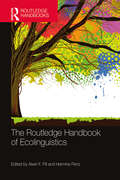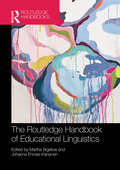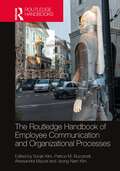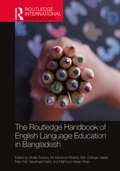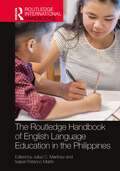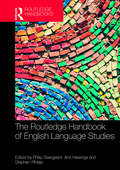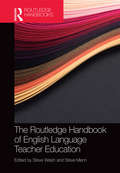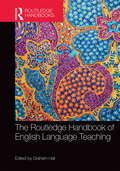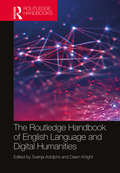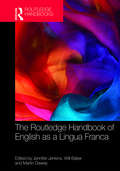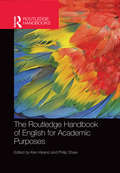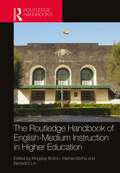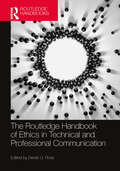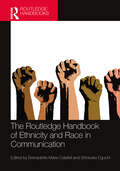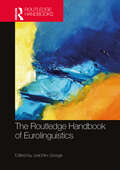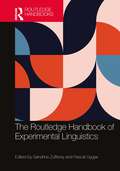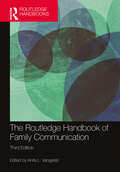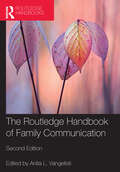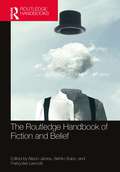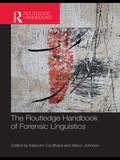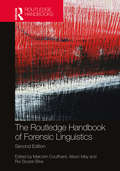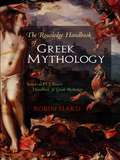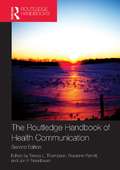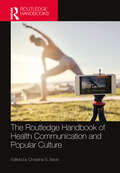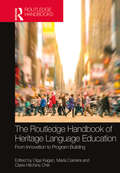- Table View
- List View
The Routledge Handbook of Ecolinguistics (Routledge Handbooks in Linguistics)
by Alwin F. Fill Hermine PenzThe Routledge Handbook of Ecolinguistics is the first comprehensive exploration into the field of ecolinguistics, also known as language ecology. Organized into three sections that treat the different topic areas of ecolinguistics, the Handbook begins with chapters on language diversity, language minorities and language endangerment, with authors providing insight into the link between the loss of languages and the loss of species. It continues with an overview of the role of language and discourse in describing, concealing, and helping to solve environmental problems. With discussions on new orientations and topics for further exploration in the field, chapters in the last section show ecolinguistics as a pacesetter into a new scientific age. This Handbook is an excellent resource for students and researchers interested in language and the environment, language contact, and beyond.
The Routledge Handbook of Educational Linguistics (Routledge Handbooks in Applied Linguistics)
by Martha Bigelow and Johanna Ennser-KananenThe Routledge Handbook of Educational Linguistics provides a comprehensive survey of the core and current language-related issues in educational contexts. Bringing together the expertise and voices of well-established as well as emerging scholars from around the world, the handbook offers over thirty authoritative and critical explorations of methodologies and contexts of educational linguistics, issues of instruction and assessment, and teacher education, as well as coverage of key topics such as advocacy, critical pedagogy, and ethics and politics of research in educational linguistics. Each chapter relates to key issues raised in the respective topic, providing additional historical background, critical discussion, reviews of pertinent research methods, and an assessment of what the future might hold. This volume embraces multiple, dynamic perspectives and a range of voices in order to move forward in new and productive directions, making The Routledge Handbook of Educational Linguistics an essential volume for any student and researcher interested in the issues surrounding language and education, particularly in multilingual and multicultural settings.
The Routledge Handbook of Employee Communication and Organizational Processes (Routledge Studies in Communication, Organization, and Organizing)
by Patrice M. Buzzanell Jeong-Nam Kim Soojin Kim Alessandra MazzeiThis Routledge Handbook takes a truly global and multidisciplinary approach to exploring all facets of employee communication.Beginning with two key disciplinary approaches—organizational communication and public relations—scholars capture and define employee communication from both perspectives, addressing commonalities and bridging disciplinary differences. This volume places importance on the everyday communicative behaviors by internal members such as leaders, managers, inter/generational cohorts, employees, and those working on behalf of organizations, such as social media influencers, and on expansive conceptualizations of employee communication such as chatbots, environment, and global supply chain members involved in organizing. With a focus on employees in situ, the authors respond to these key questions: in what ways is employee communication relevant today? What does employee communication entail? How, why, and to what extent does employee communication influence or become influenced by organizational processes?Investigating antecedents, organizational contexts and processes, and consequences of employee communication, and offering key theoretical information and empirically driven recommendations for practice, this handbook will be an essential resource for students, researchers, and industry practitioners in employee communication, organizational communication, business and management, leadership communication, and public relations more generally.
The Routledge Handbook of English Language Education in Bangladesh (Routledge International Handbooks)
by Shaila Sultana M. Moninoor Roshid Md. Zulfeqar Haider Mian Md. Naushaad Kabir Mahmud Hasan KhanThis Handbook is a comprehensive overview of English language education in Bangladesh. Presenting descriptive, theoretical, and empirical chapters as well as case studies, this Handbook, on the one hand, provides a comprehensive view of the English language teaching and learning scenario in Bangladesh, and on the other hand comes up with suggestions for possible decolonisation and de-eliticisation of English in Bangladesh. The Handbook explores a wide range of diverse endogenous and exogenous topics, all related to English language teaching and learning in Bangladesh, and acquaints readers with different perspectives, operating from the macro to the micro levels. The theoretical frameworks used are drawn from applied linguistics, education, sociology, political science, critical geography, cultural studies, psychology, and economics. The chapters examine how much generalisability the theories have for the context of Bangladesh and how the empirical data can be interpreted through different theoretical lenses. There are six sections in the Handbook covering different dynamics of English language education practices in Bangladesh, from history, policy and practice to assessment, pedagogy and identity. It is an invaluable reference source for students, researchers, and policy makers interested in English language, ELT, TESOL, and applied linguistics.
The Routledge Handbook of English Language Education in the Philippines
by Isabel Pefianco Martin Julius C. MartinezThis handbook serves as a comprehensive resource on English language education in the Philippines, addressing a wide range of issues including ideologies, multilingualism, identities, policies, methodologies, assessment, teacher education, and curriculum.Chapters cover a range of educational contexts—from Luzon to Mindanao islands, from basic to higher education, and from formal to non-formal schooling. This book upholds the think and do otherwise perspective by problematizing contemporary paradigms and practices that operate from naturalized ideas inherited from the American colonizers. This includes repairing pedagogies that redress injustices experienced by historically marginalized groups and hoping for possibilities and approaches to teaching and learning English that are just, equitable, and inclusive. The six sections in the Handbook bring up conditions for thinking and doing otherwise, pointing to ways in which genuine changes can start to happen. Scholars from diverse backgrounds come together in this handbook to take collective ownership of English language education in the Philippines. This ownership does not mean ignoring and disposing of the country’s colonial past but reclaiming English language education as an ongoing project instead. This handbook likewise demonstrates that such a project makes it possible for wider audiences to see that Global South scholars from and in the Philippines also have much to teach the rest of the world about thinking and doing otherwise and, by extension, problematizing, repairing, and hoping.Given its scope and breadth, the handbook is an invaluable reference for students, pre-service and in-service teachers, teacher educators, researchers, and policymakers interested in English language, language education, TESOL, sociolinguistics, and applied linguistics.
The Routledge Handbook of English Language Studies (Routledge Handbooks in English Language Studies)
by Philip Seargeant Stephen Pihlaja Ann HewingsThe Routledge Handbook of English Language Studies provides a comprehensive overview of English Language Studies. The book takes a three-pronged approach to examine what constitutes the phenomenon of the English language; why and in what contexts it is an important subject to study; and what the chief methodologies are that are used to study it. In 30 chapters written by leading scholars from around the world, this Handbook covers and critically examines: English Language Studies as a discipline that is changing and evolving in response to local and global pressures; definitions of English, including world Englishes, contact Englishes, and historical and colonial perspectives; the relevance of English in areas such as teaching, politics and the media; analysis of English situated in wider linguistics contexts, including psycholinguistics, sociolinguistics and linguistic ethnography. The Routledge Handbook of English Language Studies is essential reading for researchers and students working in fields related to the teaching and study of the English language in any context.
The Routledge Handbook of English Language Teacher Education (Routledge Handbooks in Applied Linguistics)
by Steve Mann Steve WalshThe Routledge Handbook of English Language Teacher Education provides an accessible, authoritative, comprehensive and up-to-date resource of English language teacher education. With an overview of historical issues, theoretical frameworks and current debates, this handbook provides unique insights into a range of teacher education contexts, focusing on key issues relating to teacher and learner priorities, language and communication, current practices, reflective practice, and research. Key features include: a cross-section of current theories, practices and issues, providing readers with a resource which can be used in a variety of contexts; the use of data, transcripts and tasks to highlight and illustrate a range of practices, including examples of ‘best practice’; ‘snapshots’ of ELTE from a number of contexts taken from all around the world; and examples of current technological advances, contemporary thinking on reflective practice, and insights gained from recent research. This wide-ranging and international collection of chapters has been written by leading experts in the field. The Routledge Handbook of English Language Teacher Education is sure to be core reading for students, researchers and educators in applied linguistics, TESOL and language education.
The Routledge Handbook of English Language Teaching (Routledge Handbooks in Applied Linguistics)
by Graham HallThe Routledge Handbook of English Language Teaching is the definitive reference volume for postgraduate and advanced undergraduate students of Applied Linguistics, ELT/TESOL, and Language Teacher Education, and for ELT professionals engaged in in-service teacher development and/or undertaking academic study. Progressing from ‘broader’ contextual issues to a ‘narrower’ focus on classrooms and classroom discourse, the volume’s inter-related themes focus on: ELT in the world: contexts and goals planning and organising ELT: curriculum, resources and settings methods and methodology: perspectives and practices second language learning and learners teaching language: knowledge, skills and pedagogy understanding the language classroom. The Handbook’s 39 chapters are written by leading figures in ELT from around the world. Mindful of the diverse pedagogical, institutional and social contexts for ELT, they convincingly present the key issues, areas of debate and dispute, and likely future developments in ELT from an applied linguistics perspective. Throughout the volume, readers are encouraged to develop their own thinking and practice in contextually appropriate ways, assisted by discussion questions and suggestions for further reading that accompany every chapter. Advisory board: Guy Cook, Diane Larsen-Freeman, Amy Tsui, and Steve Walsh
The Routledge Handbook of English Language and Digital Humanities (Routledge Handbooks in English Language Studies)
by Svenja Adolphs Dawn KnightThe Routledge Handbook of English Language and Digital Humanities serves as a reference point for key developments related to the ways in which the digital turn has shaped the study of the English language and of how the resulting methodological approaches have permeated other disciplines. It draws on modern linguistics and discourse analysis for its analytical methods and applies these approaches to the exploration and theorisation of issues within the humanities. Divided into three sections, this handbook covers: sources and corpora; analytical approaches; English language at the interface with other areas of research in the digital humanities. In covering these areas, more traditional approaches and methodologies in the humanities are recast and research challenges are re-framed through the lens of the digital. The essays in this volume highlight the opportunities for new questions to be asked and long-standing questions to be reconsidered when drawing on the digital in humanities research. This is a ground-breaking collection of essays offering incisive and essential reading for anyone with an interest in the English language and digital humanities.
The Routledge Handbook of English as a Lingua Franca (Routledge Handbooks in Applied Linguistics)
by Jennifer Jenkins Will Baker Martin DeweyThe Routledge Handbook of English as a Lingua Franca (ELF) provides an accessible, authoritative and comprehensive introduction to the main theories, concepts, contexts and applications of this rapidly developing field of study.Including 47 state-of-the art chapters from leading international scholars, the handbook covers key concepts, regional spread, linguistic features and communication processes, domains and functions, ELF in academia, ELF and pedagogy and future trends.This handbook is key reading for all those engaged in the study and research of English as a lingua franca and world/global Englishes more broadly, within English language, applied linguistics, and education.
The Routledge Handbook of English for Academic Purposes (Routledge Handbooks in Applied Linguistics)
by Ken Hyland Philip ShawThe Routledge Handbook of English for Academic Purposes provides an accessible, authoritative and comprehensive introduction to English for Academic Purposes (EAP), covering the main theories, concepts, contexts and applications of this fast growing area of applied linguistics. Forty-four chapters are organised into eight sections covering: Conceptions of EAP Contexts for EAP EAP and language skills Research perspectives Pedagogic genres Research genres Pedagogic contexts Managing learning Authored by specialists from around the world, each chapter focuses on a different area of EAP and provides a state-of-the-art review of the key ideas and concepts. Illustrative case studies are included wherever possible, setting out in an accessible way the pitfalls, challenges and opportunities of research or practice in that area. Suggestions for further reading are included with each chapter. The Routledge Handbook of English for Academic Purposes is an essential reference for advanced undergraduate and postgraduate students of EAP within English, Applied Linguistics and TESOL.
The Routledge Handbook of English-Medium Instruction in Higher Education (Routledge Handbooks in Linguistics)
by Kingsley Bolton Werner Botha Benedict LinThis Handbook discusses the theoretical and disciplinary background to the study of English-medium instruction (EMI) in higher education worldwide. It highlights issues relating to EMI pedagogy, varying motivations for EMI education, and the delivery of EMI in diverse contexts across the world. The spread of English as a teaching medium and the lingua franca of the academic world has been the subject of various debates in recent years on the perceived hegemony of the English language and the ‘domain loss’ of non-English languages in academic communication. Encompassing a wide range of contributions to the field of EMI, the chapters of this Handbook are arranged in four distinct parts: Part I provides an overview of English-medium instruction in higher education worldwide; Part II focusses on EMI in Europe; Part III on EMI in the Middle East, North Africa, and Sub-Saharan Africa; and Part IV on EMI in the Asian region. The overall scope and level of expertise of this Handbook provides an unrivalled overview of this field of education. It serves as an essential reference for many courses dealing with applied linguistics, English language education, multilingualism, sociolinguistics, and related subjects at many levels of education, including Master’s and PhD-level studies. This Handbook serves as a valuable edition for university libraries across the world and an essential read for many faculty, undergraduate and postgraduate students, educators, and policymakers.
The Routledge Handbook of Ethics in Technical and Professional Communication (Routledge Handbooks in Communication Studies)
by Derek G. RossFeaturing specially commissioned chapters from scholars and practitioners across the field, this handbook serves as a touchstone for those who wish to do ethical technical and professional communication in its myriad forms.Offering an overview of what “ethics” in technical and professional communication looks like, what “being ethical” entails, and what it means to “do ethical work,” this handbook is divided into five interrelated parts and an Afterword: Why Ethics? Foundations: What Are Ethics, and How Do They Fit into Technical and Professional Communication? Local Application: What Does “Being Ethical” Mean to the Individual? Institutional Application: What Does “Being Ethical” Mean at the Institutional Level? The Future of Ethics in Technical Communication: What Happens Next? The first of its kind, this accessibly written handbook explores descriptive, normative, applied, and meta-ethics. It will be an indispensable resource for researchers and students in the fields of Technical and Professional Communication, Writing Studies, Rhetoric, and Design.
The Routledge Handbook of Ethnicity and Race in Communication (Routledge Handbooks in Communication Studies)
by Bernadette Marie Calafell Shinsuke EguchiA much-needed text that takes stock of issues of ethnicity and race in communication studies, this book presents an overview of the most cutting-edge research, theory, and methods in the subject and advocates for centering ethnicity and race in the communication studies discipline. This handbook brings together a diverse group of both senior and up-and-coming scholars to offer original scholarship in race and ethnicity in communication studies, emphasizing various analytical perspectives including, but not limited to, global, transnational, diasporic, feminist, queer, trans, and disability approaches. While centering ethnicity and race, contributors also take an intersectional perspective in their approach to their topics and chapters. The book features examination of specific subfields, like Whiteness studies, Latina/o/x communication studies, Asian/Pacific American communication studies, African American communication and culture, and Middle East and North African communication studies. The text is oriented to graduate students and researchers within communication studies as well as media studies, cultural studies, critical race and ethnic studies, American studies, sociology, and education, while still being accessible to upper-level undergraduate students.
The Routledge Handbook of Eurolinguistics (Routledge Handbooks in Linguistics)
by Joachim GrzegaThe Routledge Handbook of Eurolinguistics provides a comprehensive survey of the typical features among European languages in cultural, geographical, or political definitions. Bringing together the latest research in the field, the handbook showcases European traditions of linguistic research on European languages.Featuring 30 chapters written by leading experts of European languages and linguistics, this book:• illustrates the major theoretical and methodological developments and institutionalizations of the field;• presents typical features for the various linguistic levels of European languages (standard and non-standard)—formally and semantically;• analyzes aspects of writing, phonological aspects, grammatical aspects, lexical aspects, language use, and multimodal aspects, including contributions on body language and sign languages; and• investigates typical commonalities with respect to various historical and current social issues with chapters on traditions of translation, multilingual settings in Europe, teaching foreign languages, and language policies.The Routledge Handbook of Eurolinguistics is essential reading for those with an interest in European languages and linguistics, language contact and change, and language typology.
The Routledge Handbook of Experimental Linguistics (Routledge Handbooks in Linguistics)
by Sandrine Zufferey Pascal GygaxThe Routledge Handbook of Experimental Linguistics provides an up-to-date and accessible overview of various ways in which experiments are used across all domains of linguistics and surveys the range of state-of-the-art methods that can be applied to analyse the language of populations with a wide range of linguistic profiles. Each chapter provides a step-by-step introduction to theoretical and methodological challenges and critically presents a wide range of studies in various domains of experimental linguistics. This handbook: • Provides a unified perspective on the data, methods and findings stemming from all experimental research in linguistics • Covers many different subfields of linguistics, including argumentation theory, discourse studies and typology • Provides an introduction to classical as well as new methods to conduct experiments such as eye tracking and brain imaging • Features a range of internationally renowned academics • Shows how experimental research can be used to study populations with various linguistic profiles, including young children, people with linguistic impairments, older adults, language learners and bilingual speakers Providing readers with a wealth of theoretical and practical information in order to guide them in designing methodologically sound linguistic experiments, this handbook is essential reading for scholars and students researching in all areas of linguistics.
The Routledge Handbook of Family Communication (ISSN)
by Anita L. VangelistiThis third edition again brings together interdisciplinary contributions to provide a comprehensive and multifaceted resource that reflects the breadth and depth of research on family communication and family relationships.Chapters continue to address theoretical and methodological issues influencing current conceptions of family and cover communication occurring in a variety of family forms and across social, cultural, and physical contexts.This third edition includes key updates, such as: The use and influence of social media and technology in families Parenting and communication in culturally and structurally diverse families Communication and physical health of family members Managing personal information about difficult topics in families The influence of the COVID-19 pandemic on family members This handbook is ideal for students and researchers interested in interpersonal and family communication, relationships, and family therapy within the disciplines of communication, social psychology, clinical psychology, sociology, and family studies.
The Routledge Handbook of Family Communication (Routledge Communication Series)
by Anita L. VangelistiWith a synthesis of research on issues key to understanding family interaction, as well as an analysis of many theoretical and methodological choices made by researchers studying family communication, the Handbook serves to advance the field by reframing old questions and stimulating new ones. The contents are comprised of chapters covering: theoretical and methodological issues influencing current conceptions of family; research and theory centering around the family life course communication occurring in a variety of family forms individual family members and their relationships dynamic communication processes taking place in families family communication embedded in social, cultural, and physical contexts. Key changes to the second edition include: updates throughout, providing a thorough and up-to-date overview of research and theory new topics reflecting the growth of the discipline, including chapters on "singles" as family members, emerging adults, and physiology and physical health. Highlighting the work of scholars across disciplines--communication, social psychology, clinical psychology, sociology, family studies, and others--this volume captures the breadth and depth of research on family communication and family relationships. The well-known contributors approach family interaction from a variety of theoretical perspectives and focus on topics ranging from the influence of structural characteristics on family relationships to the importance of specific communication processes.
The Routledge Handbook of Fiction and Belief (Routledge Literature Handbooks)
by Alison James Akihiro Kubo Françoise LavocatThe Routledge Handbook of Fiction and Belief offers a fresh reevaluation of the relationship between fiction and belief, surveying key debates and perspectives from a range of disciplines including narrative and cultural studies, science, religion, and politics. This volume draws on global, cutting edge research and theory to investigate the historically variable understandings of fictionality, and allows readers to grasp the role of fictions in our understanding of the world. This interdisciplinary approach provides a thorough introduction to the fundamental themes of: Theoretical and Philosophical Perspectives on Fiction Fiction, Fact, and Science Social Effects and Uses of Fiction Fiction and Politics Fiction and Religion Questioning how fictions in fact shape, mediate or distort our beliefs about the real world, essays in this volume outline the state of theoretical debates from the perspectives of literary theory, philosophy, sociology, religious studies, history, and the cognitive sciences. It aims to take stock of the real or supposed effects that fiction has on the world, and to offer a wide-reaching reflection on the implications of belief in fictions in the so-called “post-truth” era.
The Routledge Handbook of Forensic Linguistics (Routledge Handbooks In Applied Linguistics Ser.)
by Malcolm Coulthard Alison JohnsonThe Routledge Handbook of Forensic Linguistics provides a unique work of reference to the leading ideas, debates, topics, approaches and methodologies in Forensic Linguistics. Forensic Linguistics is the study of language and the law, covering topics from legal language and courtroom discourse to plagiarism. It looks at the linguist as expert providing evidence for the defence and prosecution, investigating areas from blackmail to trademarks and warning labels. The Routledge Handbook of Forensic Linguistics includes a comprehensive introduction to the field written by the editors and a collection of thirty-seven original chapters written by the world’s leading academics and professionals, both established and up-and-coming, designed to equip a new generation of students and researchers to carry out forensic linguistic research and analysis. The Routledge Handbook of Forensic Linguistics is the ideal resource for undergraduates or postgraduates new to the area. Malcolm Coulthard is Professor of Forensic Linguistics at Aston University, UK. Author of numerous publications, the most recent being An Introduction to Forensic Linguistics (co-authored with Alison Johnson, Routledge, 2007). Alison Johnson is Lecturer in Modern English Language at Leeds University, UK. Previous publications include An Introduction to Forensic Linguistics (co-authored with Malcolm Coulthard, Routledge, 2007). Contributors: Janet Ainsworth, Michelle Aldridge, Dawn Archer, Kelly Benneworth, Vijay Bhatia, Ronald R. Butters, Deborah Cao, Malcolm Coulthard, Paul Drew and Traci Walker, Bethany Dumas, Diana Eades, Susan Ehrlich, Fiona English, Tim Grant, Peter Gray, Gillian Grebler, Mel Greenlee, Sandra Beatriz Hale, Chris Heffer, Elizabeth Holt and Alison Johnson, Kate Howarth, Michael Jessen, Krzystof Kredens and Ruth Morris, Greg Matoesian, Gerald McMenamin, Frances Rock, Laura Felton Rosulek, Nancy Schweda-Nicholson, Roger Shuy, Lawrence Solan, Elizabeth Stokoe and Derek Edwards, Peter Tiersma, Tatiana Tkaèuková, David Walsh and Ray Bull, David Woolls, and Jerome Bruner.
The Routledge Handbook of Forensic Linguistics (Routledge Handbooks in Applied Linguistics)
by Malcolm Coulthard, Alison May and Rui Sousa-SilvaThe Routledge Handbook of Forensic Linguistics offers a comprehensive survey of the subdiscipline of Forensic Linguistics, with this new edition providing both updated overviews from leading figures in the field and exciting new contributions from the next generation of forensic linguists. The Handbook is a unique work of reference to the leading ideas, debates, topics, approaches and methodologies in forensic linguistics and language and the law. It comprises 43 chapters, including entirely new contributions from many international experts, in the areas of Aboriginal claimants, appraisal and stance, author identities online, biased language in capital trials, corpus approaches, false confessions, forensic phonetics, forensic transcription, the historical courtroom, legal interpretation, multilingual law, police crisis negotiation, speaker profiling, and trolling. The chapters include a wealth of examples and case studies so the reader can see forensic linguistics applied and in action. Edited and authored by the world’s leading academics and practitioners, The Routledge Handbook of Forensic Linguistics is a vital resource for advanced students, researchers and scholars, and will also be of interest to legal, law enforcement and security professionals.
The Routledge Handbook of Greek Mythology: Based on H.J. Rose's Handbook of Greek Mythology
by Robin HardThis new edition is a completely rewritten and revised version of Rose's original, seminal, text. Adding a huge amount of new material, Robin Hard incorporates the results of the latest research into his authoritative accounts of all the gods and heroes. The narrative framework of the book includes helpful signposting so that the book can be used as work of reference, and alongside the narrative chapters, it includes full documentation of the ancient sources, maps, and genealogical tables. Illustrated throughout with numerous photographs and line drawings, it will remain the definitive account of ancient Greek mythology for generations to come.
The Routledge Handbook of Health Communication (Routledge Communication Series)
by Teresa L. Thompson Jon F. Nussbaum Roxanne ParrottThe Routledge Handbook of Health Communication brings together the current body of scholarly work in health communication. With its expansive scope, it offers an introduction for those new to this area, summarizes work for those already learned in the area, and suggests avenues for future research on the relationships between communicative processes and health/health care delivery. This second edition of the Handbook has been organized to reflect the goals of health communication: understanding to make informed decisions and to promote formal and informal systems of care linked to health and well-being. It emphasizes work in such areas as barriers to disclosure in family conversations and medical interactions, access to popular media and advertising, and individual searches online for information and support to guide decisions and behaviors with health consequences. This edition also adds an overview of methods used in health communication and the unique challenges facing health communication researchers applying traditional methods to efforts to gain reliable and valid evidence about the role of communication for health. It introduces the promise of translational research being conducted by health communication researchers from multiple disciplines to form transdisciplinary theories and teams to increase the well-being of not only humans but the systems of care within their nations. Arguably the most comprehensive scholarly resource available for study in this area, the Routledge Handbook of Health Communication serves an invaluable role and reference for students, researchers, and scholars doing work in health communication.
The Routledge Handbook of Health Communication and Popular Culture (Routledge Handbooks in Communication Studies)
by Christina S. BeckThe Routledge Handbook of Health Communication and Popular Culture offers rich insights into the ways in which communication about health through popular culture can become a part of healing, wellness, and health-related decisions.This Handbook allows readers to understand and consider messages that inform and influence health-related choices through pop culture in the public sphere. Written in an accessible narrative style and including interdisciplinary, global, and diverse perspectives, a vast team of contributing authors from the field explores the intersections between health communication and popular culture. The Handbook is divided into five parts: Framing of Health-Related Issues in Popular Culture; Exploring Popular Culture Influences on Health Behaviors and Beliefs; Considering Pro-Social Public Health Interventions in Popular Culture; Understanding Health Issues in Popular Culture from Diverse Perspectives; and Pop Culture and Health Communication: Looks to the Future.The Handbook will be of interest to students and scholars in the fields of Communication Studies, Health Communication, Public Health Policy, Media Literacy, and Cultural Studies.
The Routledge Handbook of Heritage Language Education: From Innovation to Program Building (Routledge Handbooks in Linguistics)
by Claire Hitchens Chik Maria M. Carreira Olga E. KaganThe Routledge Handbook of Heritage Language Education provides the rapidly growing and globalizing field of heritage language (HL) education with a cohesive overview of HL programs and practices relating to language maintenance and development, setting the stage for future work in the field. Driving this effort is the belief that if research and pedagogical advances in the HL field are to have the greatest impact, HL programs need to become firmly rooted in educational systems. Against a background of cultural and linguistic diversity that characterizes the twenty-first century, the volume outlines key issues in the design and implementation of HL programs across a range of educational sectors, institutional settings, sociolinguistic conditions, and geographical locations, specifically: North and Latin America, Europe, Israel, Australia, New Zealand, Japan, and Cambodia. All levels of schooling are included as the teaching of the following languages are discussed: Albanian, Arabic, Armenian (Eastern and Western), Bengali, Brazilian Portuguese, Chinese, Czech, French, Hindi-Urdu, Japanese, Khmer, Korean, Pasifika languages, Persian, Russian, Spanish, Turkish, Vietnamese, and Yiddish. These discussions contribute to the development and establishment of HL instructional paradigms through the experiences of “actors on the ground” as they respond to local conditions, instantiate current research and pedagogical findings, and seek solutions that are workable from an organizational standpoint. The Routledge Handbook of Heritage Language Education is an ideal resource for researchers and graduate students interested in heritage language education at home or abroad.
